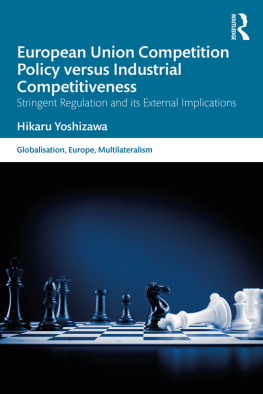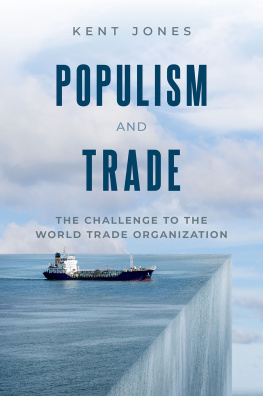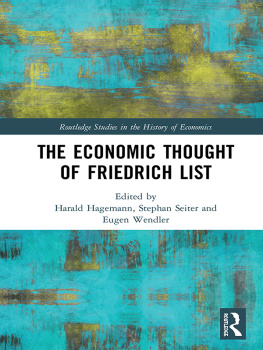Failure to Adjust
Failure to Adjust
How Americans Got Left Behind in the Global Economy
Edward Alden
A Council on Foreign Relations Book
Rowman & Littlefield
Lanham Boulder New York London
The Council on Foreign Relations (CFR) is an independent, nonpartisan membership organization, think tank, and publisher dedicated to being a resource for its members, government officials, business executives, journalists, educators and students, civic and religious leaders, and other interested citizens in order to help them better understand the world and the foreign policy choices facing the United States and other countries. Founded in 1921, CFR carries out its mission by maintaining a diverse membership, with special programs to promote interest and develop expertise in the next generation of foreign policy leaders; convening meetings at its headquarters in New York and in Washington, DC, and other cities where senior government officials, members of Congress, global leaders, and prominent thinkers come together with CFR members to discuss and debate major international issues; supporting a Studies Program that fosters independent research, enabling CFR scholars to produce articles, reports, and books and hold roundtables that analyze foreign policy issues and make concrete policy recommendations; publishing Foreign Affairs , the preeminent journal on international affairs and U.S. foreign policy; sponsoring Independent Task Forces that produce reports with both findings and policy prescriptions on the most important foreign policy topics; and providing up-to-date information and analysis about world events and American foreign policy on its website, www.cfr.org.
THE COUNCIL ON FOREIGN RELATIONS TAKES NO INSTITUTIONAL POSITION ON POLICY ISSUES AND HAS NO AFFILIATION WITH THE U.S. GOVERNMENT. ALL STATEMENTS OF FACT AND EXPRESSIONS OF OPINION CONTAINED IN ITS PUBLICATIONS ARE THE SOLE RESPONSIBILITY OF THE AUTHOR OR AUTHORS.
Published by Rowman & Littlefield
A wholly owned subsidiary of The Rowman & Littlefield Publishing Group, Inc.
4501 Forbes Boulevard, Suite 200, Lanham, Maryland 20706
www.rowman.com
Unit A, Whitacre Mews, 26-34 Stannary Street, London SE11 4AB
Copyright 2017 by Edward Alden
All rights reserved. No part of this book may be reproduced in any form or by any electronic or mechanical means, including information storage and retrieval systems, without written permission from the publisher, except by a reviewer who may quote passages in a review.
British Library Cataloguing in Publication Information Available
Library of Congress Cataloging-in-Publication Data
Names: Alden, Edward H., author.
Title: Failure to adjust : how Americans got left behind in the global economy / Edward Alden.
Description: Lanham : Rowman & Littlefield, [2016] | Includes bibliographical references and index.
Identifiers: LCCN 2016026357 (print) | LCCN 2016038649 (ebook) | ISBN 9781442272606 (cloth : alk. paper) | ISBN 9781442272613 (Electronic)
Subjects: LCSH: United StatesCommerce. | United StatesCommercial policy. | United StatesForeign economic relations. | United StatesEconomic conditions1945- | United StatesEconomic policy.
Classification: LCC HF3031 .A598 2016 (print) | LCC HF3031 (ebook) | DDC 382/.30973dc23
LC record available at https://lccn.loc.gov/2016026357
 The paper used in this publication meets the minimum requirements of American National Standard for Information SciencesPermanence of Paper for Printed Library Materials, ANSI/NISO Z39.48-1992.
The paper used in this publication meets the minimum requirements of American National Standard for Information SciencesPermanence of Paper for Printed Library Materials, ANSI/NISO Z39.48-1992.
Printed in the United States of America
Acknowledgments
This book was the result of many years of effort to make sense of the growth of global trade and investment and its impact on Americans. It began in classrooms at the University of California, Berkeley, where I was fortunate enough to learn about international institutions from such great scholars as Vinod K. Aggarwal and the late Ernst B. Haas. It continued for the many years I worked as a reporter covering international trade negotiations and disputes. I was fortunate enough to land a job at the newsletter Inside U.S. Trade , under the tutelage of editor Jutta Hennigthe grand dame of Washington trade reportersand got a ringside seat to some of the biggest international economic stories of the past half century. These included the US negotiation of the North American Free Trade Agreement with Mexico and Canada, the conclusion of the Uruguay Round that created the World Trade Organization, and the bruising battles between the United States and Japan over trade in cars and auto parts. Later, as a reporter in Washington for the Financial Times , I covered Chinas admission to the WTO, the Bush administrations controversial tariffs on steel imports, and the launch of the ill-fated Doha Round of global trade talks.
My immersion in the world of trade negotiations left me somewhat torn. My own politics mostly lean to the Democratic Party, and yet as the years went by fewer and fewer Democrats supported these efforts at trade liberalization that I believed, and still do, were largely a good thing for the United States. The United States has moved from an era of strong consensus over the benefits of global economic engagement to one in which many voters in both parties see more harm than good in Americas integration into the global economy. This book is my effort to explain how the country arrived at this impasse, to show some of the mistakes made by government, business, and labor along the way, and to suggest how the United States might better move forward in the future.
The Council on Foreign Relations has been an enormously congenial place to carry out this project. I have hosted regular CFR roundtable meetings and workshops for many years on the challenges facing the United States in international economic competition, and I have been privileged to learn from such fine scholars and policymakers as Rob Atkinson, Fred Bergsten, Robert Blecker, Aaron Brickman, Joe Gagnon, Doug Holtz-Eakin, Dan Ikenson, Brad Jensen, Jonathan Kallmer, Clay Lowery, Gary Pisano, Dan Price, Derek Scissors, Stephen Shays, Willy Shih, Shanker Singham, and Andrew Stern.
Richard N. Haass, the president of CFR, and James M. Lindsay, the director of studies, were patient and supportive throughout the research and writing. I would especially like to thank the publications team, led by Editorial Director Patricia Dorff.
The book benefited enormously from the superb research support of Rob Maxim, my former research associate who undertook detailed work on each of the chapters. Jane McMurrey and Shelton Fitch also provided valuable additional research work, as did Rebecca Strauss, formerly the associate director for CFRs Renewing America publications series. Beckys research was particularly helpful for chapter 6 of the book on the efforts to bolster US competitiveness. I am also grateful to several of CFRs interns who contributed as well, including Sebastian Beckman, Fritz Claessens, Valeriya Denisova, Michael Ng, and Sahana Kumar.
The manuscript received a careful reading and extremely valuable feedback from the members of my Council on Foreign Relations study group, composed of CFR members and others who were generous in sharing their expertise and experience: Eric Biel, Nelson Cunningham, I.M. Destler, Ed Gresser, Jennifer Hillman, Gary Horlick, Kevin Nealer, Jason Marczak, Dan OFlaherty, Bruce Stokes, John Veroneau, Irving Williamson, and John Yochelson. William Reinsch also graciously read and offered feedback on the full manuscript, as did Thomas Alden. I also benefited from the feedback of several CFR colleagues on selected chapters, including Jennifer Harris, Miles Kahler, Rob Kahn, Michael Levi, Sebastian Mallaby, Brad Setser, Benn Steill, and Thomas Bollyky. I received helpful suggestions from CFR national members in Los Angeles, Phoenix, and San Diego during roundtable meetings to discuss my research, and I want to thank Irina Faskianos, director of CFRs national and outreach program, for arranging those meetings. Any mistakes and omissions, of course, are my own.
Next page





 The paper used in this publication meets the minimum requirements of American National Standard for Information SciencesPermanence of Paper for Printed Library Materials, ANSI/NISO Z39.48-1992.
The paper used in this publication meets the minimum requirements of American National Standard for Information SciencesPermanence of Paper for Printed Library Materials, ANSI/NISO Z39.48-1992.